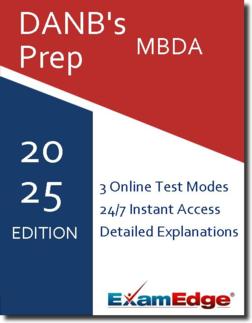DANB's MBDA (MBDA) Practice Tests & Test Prep by Exam Edge - Test Reviews
Based on 40 Reviews
- Real Exam Simulation: Timed questions and matching content build comfort for your DANB's MBDA test day.
- Instant, 24/7 Access: Web-based DANB's Missouri Test of Basic Dental Assisting Skills practice exams with no software needed.
- Clear Explanations: Step-by-step answers and explanations for your DANB's exam to strengthen understanding.
- Boosted Confidence: Reduces anxiety and improves test-taking skills to ace your DANB's Missouri Test of Basic Dental Assisting Skills (MBDA).

DANB's MBDA (MBDA) Practice Tests & Test Prep by Exam Edge - Review
DANB's Missouri Test of Basic Dental Assisting Skills - Reviews
Excellent
Based on
200
reviews
“ I found the practice tests extremely helpful. I passed the DANB RHS exam and felt that the subject matter was thoroughly covered by your practice tests. The viewing of films and answering questions on them was especially helpful. Thank you very much for the assistance in preparing for the DANB RHS e ...
Read More
Rofiah, Turnersville NJ
“ Easy to purchase & easily accessible. Great tool to use
Kay , Milton, Indiana
“ Yesterday I passed my CDA test. Your test really helped me and I just wanted to say thank you.
Charisse, NY
See why our users from 154 countries love us for their exam prep! Including 40 reviews for the DANB's MBDA exam.
Exam Edge is an Industry Leader in Online Test Prep. We work with our Institutional Partners to offer a wide array of practice tests that will help you prepare for your big exam. No Matter how niche field of interest might be, were here to help you prepare for your test day.
| 2.8M | 4.5M | |
| Users | Tests Taken | |
| 100K | 19 | |
| Unique Exams | Years in Business | |


